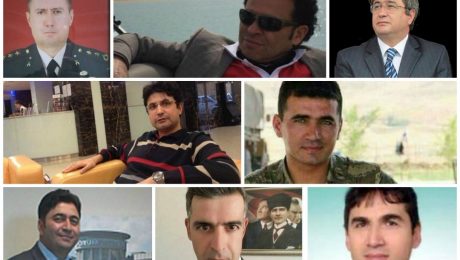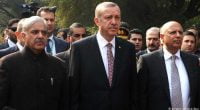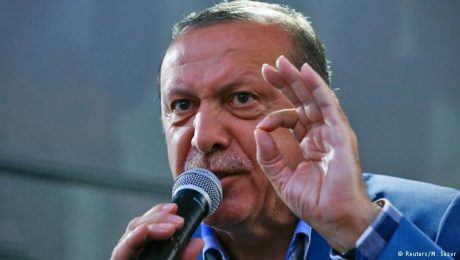Keyword: Turkey

Suspicious deaths, suicides become common occurrence in post-coup Turkey
The number of people who die in suspicious circumstances after being linked to the July 15 coup attempt has been rising with every passing day, a systematic occurrence that is casting a shadow over official statements pointing to suicide. At least 14 people have reportedly committed suicide. The relatives of most of them claim that the detainees are not the kind of people to commit suicide. Rumours also have it that some of the detainees were killed after being subjected to torture under custody.

Fethullah Gülen’s message to his sympathizers in the aftermath of the coup attempt
I hope that those who set their hearts on a cause will not loosen their hands about working on the world solidarity and universal human values, and they will continue on their way. I hope they do not get shaken by such storms, with Allah’s permission and help. Just like all the things happened until today had passed and became history, these latest incidents will pass and become history, with Allah’s permission.

Veteran who lost legs in PKK attack removed from civil service over Gulen links
A Kırıkkale man who lost his both legs in a PKK attack while doing military service in the eastern province of Bingöl, has been sacked from a state institution after authorities found out that private colleges linked to Gülen Movement granted scholarship to his children.

Slain prosecutor’s daughter: My father was not with Gülen movement
The daughter of former Bursa public prosecutor Seyfettin Yiğit, who allegedly committed suicide in a prison bathroom on Friday morning after he was put behind bars over Gülen movement ties, said on Saturday that her father was not affiliated with the Gülen movement but was with the Süleymancı movement, an Islamic movement in Turkey founded by Turkish Islamic scholar Süleyman Hilmi Tunahan in the early 20th century.

Turkey overshadows war-hit Syria in number of academics seeking asylum elsewhere
The New York-based Scholar Rescue Fund, a part of the Institute of International Education (IIE) has received an unprecedented number of requests for help, its director Sarah Willcox told an audience at the European Association for International Education’s annual conference, held in Liverpool from 13 to 16 September, Times Higher Education (THE) reported.

Amnesty International researcher criticizes witch-hunt in Turkey
Amnesty International’s Turkey researcher has leveled sharp criticism against Turkey over ongoing purges that have followed a failed coup attempt in July and said arrests and firings over alleged links to the Gülen movement have now turned into a wide-ranging witch-hunt. He said arrest and detentions, which are based on no evidence, are bound to inflict damage to the notions of rule of law and freedom of expression.

Turks See Purge as Witch Hunt of ‘Medieval’ Darkness
Candan Badem teaches history at a university in southern Turkey, is a socialist and does not believe in God. But he lost his job and was hauled in by the police and accused of being a loyalist to a shadowy Islamic cleric who lives in exile in Pennsylvania.

Erdogan: A saint elsewhere, outside Turkey’s shores?
On a recent trip to Spain, I picked a copy of the International New York Times, and saw a story that shocked me greatly. It said Mr Erdogan had ordered the release of 38,000 prisoners serving various jail terms, for different offences, in order to make space for the so-called coup plotters who had no space in Turkey’s overflowing prison. I was totally shocked by the news because I can’t imagine a situation where convicted criminals are being set free just so political opponents can be locked up.

Can a Post-Coup Turkey Get Along with Europe?
None of this has stopped the government from undertaking a huge, self-destructive purge, with around 10,000 people arrested, 100,000 people dismissed, and the seizure of assets of more than $4 billion, numbers that worry not just human rights activists but foreign investors as well. The government’s fury is understandable but it should distinguish between those who took part in the coup and those who simply belonged to the Gulen movement.

Gulen suspect testifies before US Congress on recent coup attempt
An alleged member of the Fetullah Gulen organization was invited on Wednesday to speak to a congressional panel on Turkey, a stunning move that could exacerbate tensions between Ankara and Washington. Ahmet Sait Yayla was added to the original list of speakers to address the House Foreign Affairs Subcommittee on Europe, Eurasia and Emerging Threats.

Turkey’s Changing Freedom Deficit
Erdoğan’s government is by no means the first to compel Turkish citizens to hide their preferences and beliefs. Under the secular governments that ruled Turkey from the 1920s to 1950, and to some extent until 2002, pious Turks seeking advancement in government, the military, and even commerce had to downplay their religiosity and avoid signaling approval of political Islam.

Fear and paranoia still stalk Turkey two months after the failed coup
The official government narrative is everywhere, from the Twitter accounts to the dominance of the state-affiliated and pro-government press and TV in the wake of media crackdowns. The same words and phrases have been repeated endlessly by the AKP and their supporters until they become almost meaningless – Get Gülen. Gülen. Gülen. We are democracy. Democracy. Democracy. That is how it is, and there is no room to consider anything else.

Turkey’s Intelligentsia Kneels to Erdogan
This selective application of democratic rights by Turkey’s intelligentsia only helps Mr. Erdogan consolidate his power. In their double standards, he finds tacit approval for his purges. Turkey lacks not only sturdy institutions that guarantee a system of checks and balances and the rule of law, but also a critical mass of citizens with the courage and integrity to demand them.



















